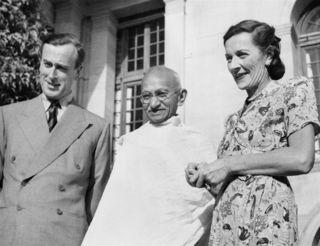Marriage
If Gandhi Was Your Marriage Therapist
Applying his principles of fairness and peace can strengthen your relationship.
Posted July 14, 2017
Mohandas Gandhi was born in India in 1869. As a young man, he left to study law in Great Britain, and later he moved with his wife and children to South Africa, where he began to practice as an attorney. There he experienced painful discrimination and abuse, and once was beaten by a stagecoach driver for refusing to give up his seat for a European. This galvanized Gandhi’s resolve to fight injustice through principles of satyagraha (“truth and firmness”) he had learned from his mother.

Through extraordinary strength and sacrifice, Gandhi developed and practiced philosophies of nonviolence, eventually becoming known as Mahatma, or the great-souled one. He became a leader in India’s push for independence from Great Britain, inspiring efforts for peace and equality worldwide.
Using Nonviolence Principles to Understand Couples
Gandhi’s life profoundly influenced many political leaders, including Martin Luther King Jr. and Nelson Mandela, as well public figures like Albert Einstein and John Lennon. His teachings are powerful and have changed millions of lives, but do they apply in intimate relationships? Along with colleagues, I did a study examining interviews with men and women about their love lives. We wanted to see if partners’ attempts to reduce conflict were consistent with nonviolence principles, so we spent hours reading stories on conflict and abuse. People gave detailed accounts of their fights, adjustments, and reconciliation attempts. We discovered their successes often reflected principles consistent with Gandhi’s ideals of fairness, commitment, and responsibility.
Obviously, I am being presumptuous by imagining what Gandhi would say in a therapist’s chair, but it is safe to assume he would emphasize core aspects of his life and teachings. Here are five of his principles; along with quotes from our research couples that illustrate what might be discussed in therapy with the great-souled one.
1. Partners must be the change they want to see in the relationship.
One of Gandhi’s best known tenets is that each person must take responsibility for change. It is always easy to see another’s flaws, but those are only half of the problem. When partners point fingers, they inflame problems, but when they change their misbehavior, they move toward solutions.
In my research, one woman decided to take responsibility for her role in a nasty fight: “It takes two people to keep an argument going, and I’ve realized that. What I’ve done was wrong. I shouldn’t have done the stuff I did.” Another man felt sorrow after a blow up and took the hard step of acknowledging his anger habit: “One bad night makes you look at yourself and say, you know what, I’m not that controlled person I thought I was.” Gandhi taught that complaints are empty, but self-action will bring change, and invite others to change as well.
2. Others are equal and legitimate.
Gandhi personally experienced the degrading effects of caste systems, where some oppress and objectify others. In contrast, Gandhi taught that all are equal and deserving of respect. Likewise, in intimate relationships, problems arise when one acts smug and assumes their view is the best. Healthy relationships include partners who value each other’s opinions, and play fair. When one silences or shuts down the other, it causes harm.
One man in my study had undergone treatment for his abusive behavior. While there, he absorbed powerful lessons about respect for women, and the phoniness of arrogance. He recalled: “It’s not about gender, it’s about humanity. And we have to learn to deal with each other on an equal plane, and be on the same level . . . I don’t even understand all the things there are to understand about entitlement. I’ll spend the rest of my life learning that.”
3. Partners share a commitment to protest wrongs.
Gandhi was a man of peace, but protested vigorously against injustice. He said, “Non-cooperation with evil is as much a duty as is cooperation with good.” He also advocated for women and valued their voices. In strong relationships, both speak up about problems and avoid sweeping them under the rug. Partners request respect, which roots out problems and fosters a climate where both can speak and be heard.
Some research participants assertively addressed their relational concerns. One said: “Most of the time I speak my mind. If I don’t want it to happen again then I’m gonna tell you that it bothered me.” Another stopped a fight as it was escalating: “I said, ‘OK, this is getting out of control. We need to stop and . . . talk about this later when we can . . . talk about it without getting upset and yelling at each other. . . it’s not doing any good.’” Sometimes, peace is attained by a strong but respectful voice.
4. Influence should come from love, not fear.
Gandhi believed the way to change a problem was through love, not threats. Some partners use anger, shaming, or badgering to get their way, but these always bring resentment. In contrast, couples who kindly request things of each other do better. For example, one pair I worked with in therapy disagreed about how to deal with their toddler’s tantrums. Jodi did not like the way John (names have been changed) shouted and spanked. She threatened him: “If you can’t control yourself, I am leaving.” John was annoyed and defensive: “You are too soft on him and he is becoming spoiled.” Later, Jodi tried kindness: “I don’t want us to fight, but it hurts me to see you lose your temper and scare him. I want us to work together in a way we both feel good about. You are a good father and this is hard.” John was moved by this and they made a new plan.
Many couples from the research found that love was the better way to request change. One woman learned to start with the positive: “I tell him how I feel and show him the commitment that we’ve had for two years.” Another man had to stop forcing his opinions onto his wife: “I have to consciously try to not . . . be in control of her. . . Now I try to let her make her own decision.” Loving requests creates change that will last.
5. An eye for an eye will only make both partners blind.
Gandhi taught that violence creates more problems than it solves. Even if retaliation “works” by shutting someone down, it bruises emotions and relationships. This is particularly true in abusive couples, where screaming and hitting is used to control and beat down the spirit of another. Petty vengeance will poison love, but patience and kindness will nourish it. For example, research has continually found that in strong marriages, spouses use positive emotions to regroup when things are going wrong. They take a time out, express commitment to each other, apologize, and move on. This cools down an interaction that was heading towards the boiling point.
It is hard to choose peace, especially when emotions start to flow, but it can be very powerful. In my study, one woman described her efforts to keep defenses down: “I try to listen and … put myself in his shoes to see how that would sound . . . frequently I’ll hit a point where I’m like ‘Yeah, OK. What you said is absolutely right.’” Another calmly expressed love and changed direction when things became aggressive, “I still love you, let’s take a deep breath and go watch TV.”
Gandhi refused to give into anger and retaliation, even when provoked by those who hated him. His life demonstrated that people who choose fairness, justice, and love can bring about powerful change. Couples who follow his guidance will be creating good therapy in their own relationships.
References
Whiting, J. B., Harris, S. F., Oka, M, & Cravens, J. D. (2016). Be the change you want to see: Discovering principles of nonviolent social movements in intimate relationships. The Family Journal, 24, 367-377.




